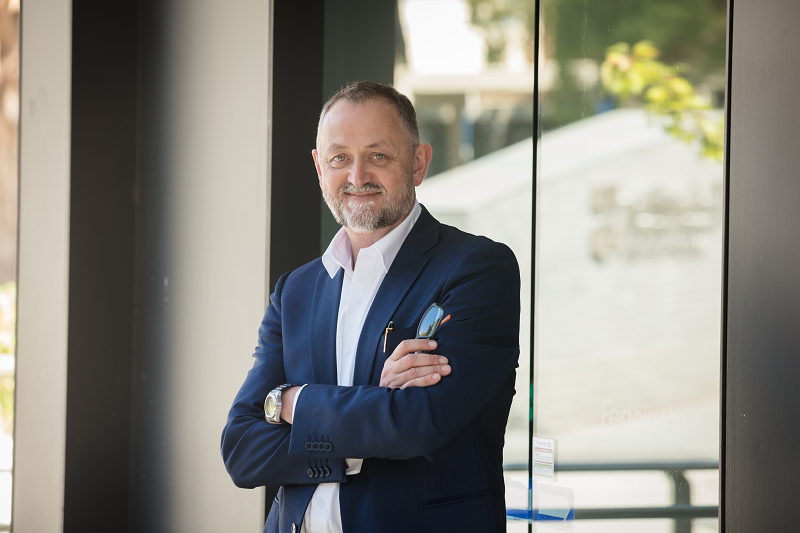UNE’s new Provost and Deputy Vice-Chancellor, Todd Walker, is very familiar with the needs of a regional university. He has held the positions of Deputy Vice-Chancellor (Engagement), Deputy Vice-Chancellor (Learning and Quality) and Pro Vice-Chancellor (Learning and Quality) at Charles Sturt University, the University of Ballarat, and Federation University Australia.
An accomplished clinical cytologist, Professor Walker has a First Class Honours degree in Medical Biotechnology, a PhD in Molecular Oncology and a Graduate Certificate in University Leadership and Management, all from Charles Sturt University.
He talks here about leadership, photography and walking the Kokoda Track – twice.
Describe your career path to date.
I always enjoyed science and had an interest in the biological sciences. I ended up, fortuitously, in what is called cell pathology. I spent the decade before doing my PhD working in hospital pathology departments, looking at cells and diagnosing cancers. I learnt a lot about how people respond to good and bad news. Ironically, that stood me in good stead for future teaching and administrative roles, because communication is about being honest and upfront. I’ve found that people can handle bad news; what they can’t handle is no news.
I then moved into my PhD, which focussed on the molecular biology of cancer. I enjoyed working with research teams and teaching students and, from there, I began managing staff in administrative roles. It’s a trajectory that I think suits my skills. I’m a people person.
Who have been your major mentors in life?
I have always aligned myself with those people who were unafraid to take themselves out of their comfort zone. I have found mentors in pathologists at the cutting-edge of cancer diagnosis and treatment; I’ve been drawn to people whose values are reflected in what they do on a day-to-day basis; and I’ve had a series of wonderful supervisors and colleagues who have taught me a lot about myself and the importance of having the courage to take a chance and do something new and exciting. I’ve been very fortunate to have had good champions in my corner.
Why did you become a national White Ribbon ambassador?
White Ribbon Day is about men stepping up to the plate and committing to change in our society. It’s a national problem – at least one woman a week dies from domestic violence – so we need to accept that it’s a man’s problem to solve. White Ribbon Day doesn’t blame men as the cause; it places men at the centre of the solution.
I have seen some unhealthy relationships, and inequality for women in the workplace, in the home and in the community, not just in Australian society but internationally; I think that part of my purpose in life is to make some small change towards preventing that inequality. I have done a lot around unconscious bias training, domestic violence, workplace and community programs. I helped to steer Federation University towards becoming a White Ribbon-accredited workplace and I have started some discussions here at UNE to see what we can do in that space.
You’ve organised two university walks on the Kokoda Track and hope to take a UNE group this year. What is it about the track that attracts you?
I celebrated my 50th birthday in 2013, and walking the track had always been on my bucket list. You have to find a reason to walk the Kokoda; it’s a 96-kilometre walk up and down hills and mountain ranges for nine days in 100% humidity and 35-degree heat. I invited staff and students to come along and it was a tremendous levelling experience. It was life-changing for all of us, but I felt I needed to go back (in 2014). A group at Federation University has been going every year since. I have probably got one more left in me and would like to establish the tradition at UNE.
Most people train for the physicality of it, but are unprepared for both the mental aspect and the spiritual connection you form with the history of Australia and the Diggers of the second World War. It’s a largely untold part of Australia’s modern history. People the same age as our students fought and died on the track. Anybody who walks it comes back changed in some way; it gives you plenty of time to reflect on your life and is a test of your strength and purpose and will. It’s very humbling, and has taught me that leadership is not about being at the front, leading the way; it’s about changing your pace and being at the back and helping those who are struggling to achieve their goals.
What do you do to relax?
I have always been interested in looking at things; I think that comes from my days of looking down microscopes. Shapes and colours and tones and light have always been important to me. I took up photography when I was travelling a lot as the Deputy Vice-Chancellor (Engagement) at Federation University. I recently exhibited some of my photos at the Ballarat International Foto Biennale, predominantly black and white images from a trip to Europe.
I have always enjoyed the arts, and visiting galleries, and I come from a family of artists. My wife is a painter, my daughter is about to study fine arts and my son is a jazz musician. I also enjoy bushwalking, a bit of cycling and reading.


